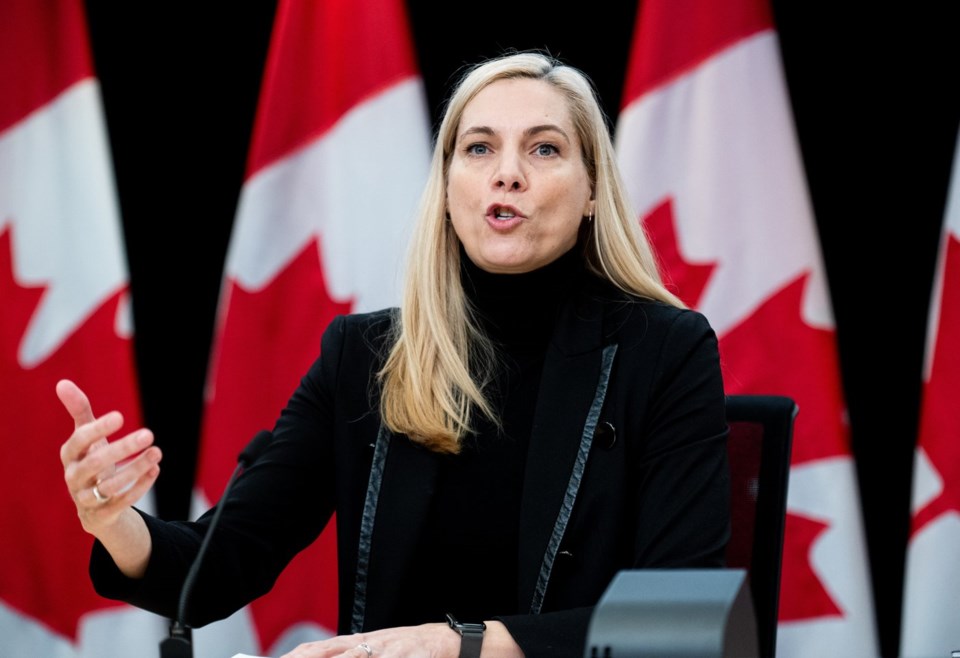OTTAWA — Federal Heritage Minister Pascale St-Onge's plan to modernize the mandate of CBC and Radio-Canada would bar them from running ads during news programming and from charging subscription fees for digital products such as CBC Gem.
In turn, the government would increase the public broadcaster's funding and make it more stable.
St-Onge said Canadians "shouldn't have to pay twice" for the public broadcaster's services.
St-Onge, who released her revised mandate plan for CBC and Radio-Canada Thursday, presented it as a way to counter the online influence of Meta CEO Mark Zuckerberg and billionaire Elon Musk.
"CBC/Radio-Canada will never belong to the billionaire tech oligarchs like Musk or Zuckerberg," she said.
St-Onge previously told The Canadian Press that Musk’s “meddling” in politics and recent changes at Meta to eliminate fact-checking make Conservative Leader Pierre Poilievre’s repeated promise to defund the CBC even more consequential.
She took aim at Poilievre again on Thursday, saying "you cannot say you love Canada and yet pledge to destroy our public broadcaster that is central in telling the stories of our country."
She argued the public broadcaster is “more relevant than ever in the current context … and to not understand that reality shows the lack of understanding of the global context that we're in, and it shows the lack of love for our own country.”
Poilievre’s pledge to defund the CBC has been a crowd-pleaser at his rallies but he didn’t repeat the line at last weekend's rally.
Asked by reporters Thursday what CBC/Radio-Canada's role should be, Poilievre said he would "cut wasteful spending." He said the Liberal government continues to fund the public broadcaster despite what Poilievre said were low television viewership numbers.
St-Onge argued freedom of expression needs to be protected at a time when the richest people in the world control massive communications platforms and are working to influence political conditions in other countries.
She said the public funding CBC/Radio-Canada receives is about half the G7 average for national public broadcasters and she would like to bring it more in line with other countries.
"In Canada, we're second to last with $33 per year per person. We're closer to the United States than to any other country ... and I don't think that we want the United States to be our reference," she said.
The minister also said she wants to enshrine the importance of delivering impartial news coverage in the CBC's mandate.
But St-Onge isn't likely to have time to implement her plan, with an election likely to come this spring.
St-Onge has said she will not run in that election, adding she is a new mom and wants to be present in the early years of her child’s life.
News Media Canada, which represents Canadian news publishers, welcomed St-Onge’s proposal to eliminate advertising on CBC/Radio-Canada news programming.
"We have been making the case for years that private sector publishers shouldn’t be competing with the CBC for scarce advertising dollars," CEO Paul Deegan said.
Advocacy group Friends of Canadian Media said in a press release St-Onge presented the "most comprehensive and audacious plan to revitalize the CBC/Radio Canada that we have seen in decades."
The group noted St-Onge’s proposal comes as U.S. President Donald Trump has taken aim at Canada. Trump has threatened to impose economically devastating tariffs on Canada and has said repeatedly he wants to see Canada become the 51st U.S. state.
“Now more than ever, Canadians are closing ranks around our cherished public institutions and expect our politicians to do the same," executive director Maria Boltman said.
This report by The Canadian Press was first published Feb. 20, 2024.
Anja Karadeglija, The Canadian Press




